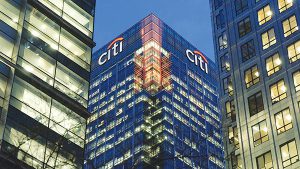Bloomberg
The money manager behind a Russia-focused ETF that collapsed after the country invaded Ukraine is warning that bank fees are “significantly eroding†what little of the fund’s value remains.
VanEck said Citigroup Inc, JPMorgan Chase & Co. and Bank of New York Mellon are charging fees on Russian depository receipts that its Russia ETF (ticker RSX) primarily holds, costing at least 20% of the product’s assets, which have slumped to about $37 million.
“Investors, such as RSX and other funds and individuals that hold receipts, are being materially hurt by the banks’ fee,†VanEck said in a post this week on its website. “Stated another way, the banks win and shareholders lose.â€
All three banks declined to comment. VanEck said it contacted the banks privately
before publishing its post.
Funds and investors haven’t been able to trade Russian receipts since exchanges halted the securities in the wake of the Ukraine war. That means they haven’t been benefitting from the liquidity that receipts can provide that would justify paying the bank fees, VanEck said.
The ETF issuer said it’s “publicly calling on these banks to do the fair thing for receipt holders†— waive all fees for receipts listed on U.S. and U.K. exchanges, the types of receipt that RSX holds. VanEck also asked investors in RSX to urge the banks to forgo fees.
The fees pose another headache for ETF issuers amid the market turmoil stemming from the Ukraine war. Russia-focused ETFs stopped trading in the weeks after the war started in February, a first for the industry whose products had continued to trade in previous geopolitical crises. In the past few months, issuers have also shuttered some Russia-focused ETFs listed in Europe, but have so far maintained US-listed products.
The value of RSX’s assets has plunged from $1.4 billion at the start of this year. Most of the securities in the fund have been marked down to, or close to, zero. Given the amount of bank fees relative to RSX’s assets, the charges could “materially erode the fund’s value over time,†VanEck said.
There are two types of fees associated with the depository receipts. The first is annual fees that banks charge for maintaining the receipts. While the banks haven’t said whether they’ll waive those fees, some have already been charged, VanEck said. The issuer estimates the current annual fees to be $450,000, or 1.2% of the fund’s assets.
The second, more onerous, type is a fee for converting the receipts to the underlying Russian shares. In April, the Russian government required Russian companies to delist their overseas shares. Under that law, foreign holders of depository receipts have their receipts converted to Russian ordinary shares.
Even though these conversions are forced onto receipt holders, banks are still charging for them, VanEck said. The issuer estimates these charges to amount to about $7.2 million, or 19% of RSX’s assets.
VanEck itself has implemented a voluntary waiver of fund-management fees it charges RSX investors.
“We are asking the banks to be reasonable with their depository receipt fees as well,†the issuer said.
 The Gulf Time Newspaper One of the finest business newspapers in the UAE brought to you by our professional writers and editors.
The Gulf Time Newspaper One of the finest business newspapers in the UAE brought to you by our professional writers and editors.
